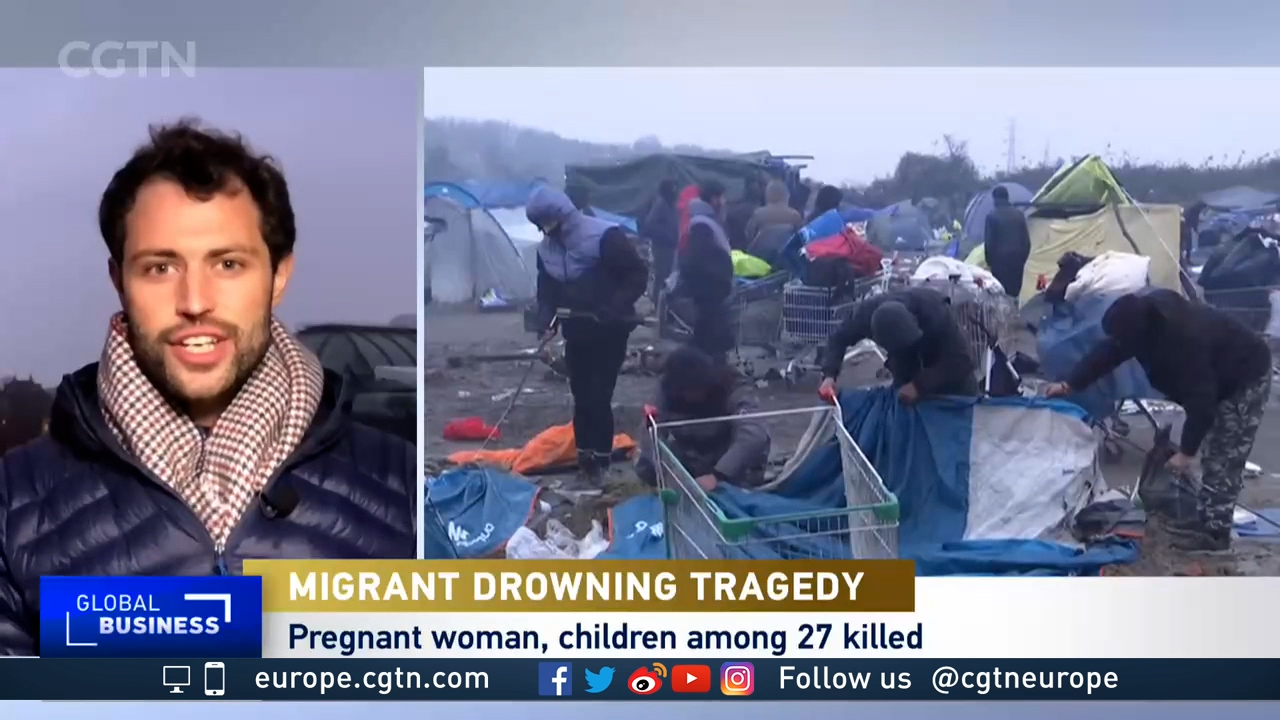02:43

France and the UK traded blame Thursday after 27 people died trying to cross the Channel in an inflatable dinghy, the worst accident of its kind on record in the waterway separating the two countries.
Seventeen men, seven women – including one who was pregnant – and three children died when the boat lost air and took on water off the northern port of Calais on Wednesday, according to public prosecutors in Lille. A manslaughter inquiry has been opened.
Interior Minister Gerald Darmanin said a total of five suspected traffickers accused of being directly linked to the doomed crossing had been arrested, the fifth man is suspected of buying inflatable boats for the crossing.
Darmanin said only two survivors, an Iraqi and Somali, had been found and they were recovering from extreme hypothermia and would eventually be questioned.
With relations fraught by years of tension over Brexit and immigration, much of the focus was on who should bear responsibility, even if both sides vowed to work together to find joint solutions.
"There is bad immigration management [in Britain]," Darmanin told RTL radio. while calling on other European countries, which migrants cross on their way to the north coast of France, to do more to help.
"It's an international problem," Darmanin said. "We tell our Belgian, German and British friends they should help us fight traffickers who work at an international level."
Meanwhile, UK Prime Minister Boris Johnson took aim at France: "We have had difficulty persuading some of our partners, particularly the French, to do things in a way that we think the situation deserves."
On Thursday, French President Emmanuel Macron stated: "We need stronger European cooperation in this area. France is a transit country."
Adding: "I will also say very clearly that our security forces are mobilized day and night."
French authorities announced that five suspected people-smugglers had been arrested in connection with the disaster.
02:08

Blame game
The UK has repeated an offer to have joint British-French patrols along the French coast near Calais, from where Britain can be seen on a clear day and from where most migrants take to the water.
Paris has previously resisted such calls, and it is unclear if the government will change its mind five months before a presidential election in which migration and security are key topics. London has in the past threatened to cut financial support for France's border policing if it fails to stop the crossings.
"We're prepared to offer support on the ground, we're prepared to offer resources," Britain's Immigration Minister Kevin Foster told the BBC.
"We're prepared to offer, literally, people to go there and help and assist the French authorities."
"We're clear – we don't just see this as an issue that France needs to deal with, but one that we want to work together with France and our wider European partners ... to break the business model of these gangs," Foster said.
Regaining control of Britain's borders was a totem for Brexit campaigners ahead of the 2016 referendum on EU membership.
Before Wednesday's disaster, 14 people were known to have drowned this year trying to make it to the UK, a local maritime prefecture official said. In 2020, seven people died and two disappeared, while in 2019, four died.

French police patrol near the Slack dunes, the day after 27 migrants died when their dinghy deflated as they attempted to cross the English Channel, in Wimereux, near Calais, France. /Reuters/Pascal Rossignol
French police patrol near the Slack dunes, the day after 27 migrants died when their dinghy deflated as they attempted to cross the English Channel, in Wimereux, near Calais, France. /Reuters/Pascal Rossignol
'Hiding from responsibility'
Meanwhile, rescue volunteers and rights groups said the drowning was expected as smugglers and migrants take more risks to avoid a growing police presence.
"To accuse only the smugglers is to hide the responsibility of the French and British authorities," the Auberge de Migrants non-governmental organization (NGO) said.
It and other NGOs pointed to a lack of legal migration routes and heightened security at the Eurotunnel undersea rail link, which has pushed migrants to try to make the dangerous sea crossing.
The Channel is one of the world's busiest shipping lanes, where currents are strong, the water is cold and dinghies are often overloaded.
"This a tragedy that we dreaded, that was expected, we had sounded the alarm," said Bernard Barron, head of the Calais region SNSM, a volunteer group that rescues people at sea.
"The smugglers are more and more reckless, criminal, launching at sea poor innocent people who want to reach England at all costs without knowing the sea."
Compared: Asylum-seekers in France and UK
France was third in the top European destinations for asylum-seekers last year, with 93,475 applicants, significantly more than the 36,041 applicants in the UK, according to figures from the UNHCR.
According to the University of Oxford's The Migration Observatory, from January to September 2020, 98 percent of the people who arrived in the UK by crossing the English Channel in small boats claimed asylum.
Asylum-seekers in France cannot work for the first six months of their application. They receive government support, roughly around $7.63 per day. In the UK, people seeking asylum are often living on government support equivalent to $7.54 per day, according to the Refugee Council, while the majority of those arriving in the UK know nothing about the welfare benefits they might receive.
The most common country of origin for people seeking asylum in the UK are Iran, Iraq, Albania, Eritrea, Sudan, Syria, and Afghanistan.
Source(s): Reuters

